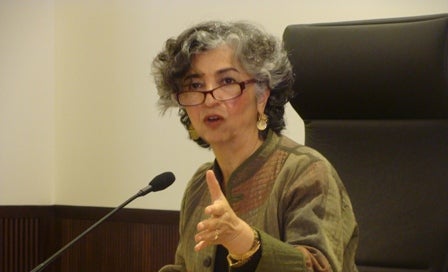Dialogue Series, Race & Society, Regional Studies
Shahla Haeri on Women and Political Leadership in Muslim Societies

Shahla Haeri, a cultural anthropologist and a 2011-2012 CIRS Visiting Scholar, gave a Focused Discussion titled, “From Bilqis to Benazir: Women and Political Leadership in Muslim Societies” on February 26, 2012. Haeri’s current research interests revolve around examining Muslim women in positions of power, both past and present.
Haeri began her talk by critiquing western media accounts of the Arab Spring that pondered the motivations compelling Muslim women to suddenly become active in politics. She pointed out that there was nothing sudden or unprecedented about Muslim women’s participation in the political domain as evidenced by the long and rich history of women in leadership roles. Haeri recounted the Judeo-Islamic story of the Queen of Sheba, also known as Bilqis, as one that is prominent in the Qur’an and favorably portrays the queen as a wise, intelligent, and caring ruler. The story of the Queen of Sheba shows that “the Queen’s gender is immaterial to her leadership and governance, and gender politics plays no role in this Qur’anic story.” The story, however, has seldom played an important role in modern Muslim feminist discourse. “Given that this story permeates popular cultures and is explicitly specified in the Qur’an, what has prevented Muslim women from appropriating the Queen’s model of leadership and actively participating in the political life of their societies?” Haeri mused.
The answer to this question, she said, can be found in the dynamics of an alleged hadith, or prophetic saying, and its patriarchal resonance in Muslim societies. The Prophet is reported to have said “those who entrust their affairs to women will never know prosperity.” In order to reconcile these two opposing narratives, Haeri proposed juxtaposing the Qur’anic story that supports women’s political leadership with that of its reported condemnation in the hadith in order to determine the patriarchal and political machinations at work in undermining women in leadership roles.
As examples of Muslim women in power, Haeri offered Raziya Sultan, ruler of the medieval Mamluk dynasty in India; Benazir Bhutto, the late Prime Minister of Pakistan who was democratically elected as leader of a highly conservative Muslim nation; and Ayesha, the Prophet’s wife, who led the “Battle of the Camel” against the reigning Caliph Ali. By examining the many historical examples of Muslim women in positions of power, Haeri highlighted the religious ambivalence regarding Muslim women leaders rather than a categorical condemnation. Predominant patriarchal opposition, she argued, happens within a socio-political sphere, rather than emanating primarily from the scripture.
All these women, although hailing from different cultural traditions and historical periods, shared a distinguished genealogical pedigree and had support from their powerful fathers or husbands. As Haeri explained, “the patriarch’s support bestows power and prestige on the daughter, facilitates her presence in the public domain, and legitimates her political authority and activities,” thus working to silence her detractors. Here lies what she has called “paradox of patriarchy.” While “history provides ample examples of fatal rivalries between the imperial fathers and coveting sons, little is said on the political implications of the relationships between a patriarch and his daughter, whom he may indeed favor over his sons who are in a structural position to dislodge the patriarch from his position of authority.”
Haeri ended her discussion by noting that popular views against women in leadership were/are often emanating from patriarchal and political discourse, and not necessarily from religious or scriptural dictates. “Aware of the hierarchy of the sources of authority in Islam – that between the Qur’anic revelations supporting women’s leadership and the alleged Prophetic hadith opposing it – religious authorities bide their time until an opportune moment arises to challenge the authority of a queen, a sultan, or a prime minister.”
Shahla Haeri is an Associate Professor of Cultural Anthropology and the former director of Women’s Studies Program (2001-2010) at Boston University. Trained as a Cultural Anthropologist with specific focus on law and religion, Haeri has conducted ethnographic research in Iran, Pakistan, and India. Her ongoing intellectual and academic interests converge on the evolving yet contentious relationship between religion/law, gender, and the state in the Muslim world in general, and in Iran in particular. She is the author of Law of Desire: Temporary Marriage, Mut’a, in Iran (1989, 2006 4th pt. Arabic Tr.13th printing 2010), and No Shame for the Sun: Lives of Professional Pakistani women (2002/2004).
She is the recipient of the 2011-2012 Visiting Fellowship at Georgetown University’s Center for International and Regional Studies (CIRS) at Doha, Qatar. She has been awarded several grants and postdoctoral fellowships, including Henderson Senior Research Fellowships in the Humanities at Boston University (2008-2009), Women’s Studies in Religion Studies at Harvard Divinity School (Colorado Scholar; 2005-2006), Fulbright (1999-2000, 2002-2003), St. Anthony’s College, Oxford University (1996), American Institute of Pakistan Studies, (1991-1992), Social Science Research Council (1987-1988), Pembroke Center for Teaching and Research on Women, Brown University (1986-1987), and the Center for Middle Eastern Studies, Harvard University (1985-1986).
Dr. Haeri has produced a short video documentary (46 min.) entitled, Mrs. President: Women and Political Leadership in Iran, focusing on six women presidential contenders in Iran in 2001. This documentary is distributed by Films for Humanities and Sciences (www.films.com).
Article by Suzi Mirgani, Manager and Editor for CIRS Publications